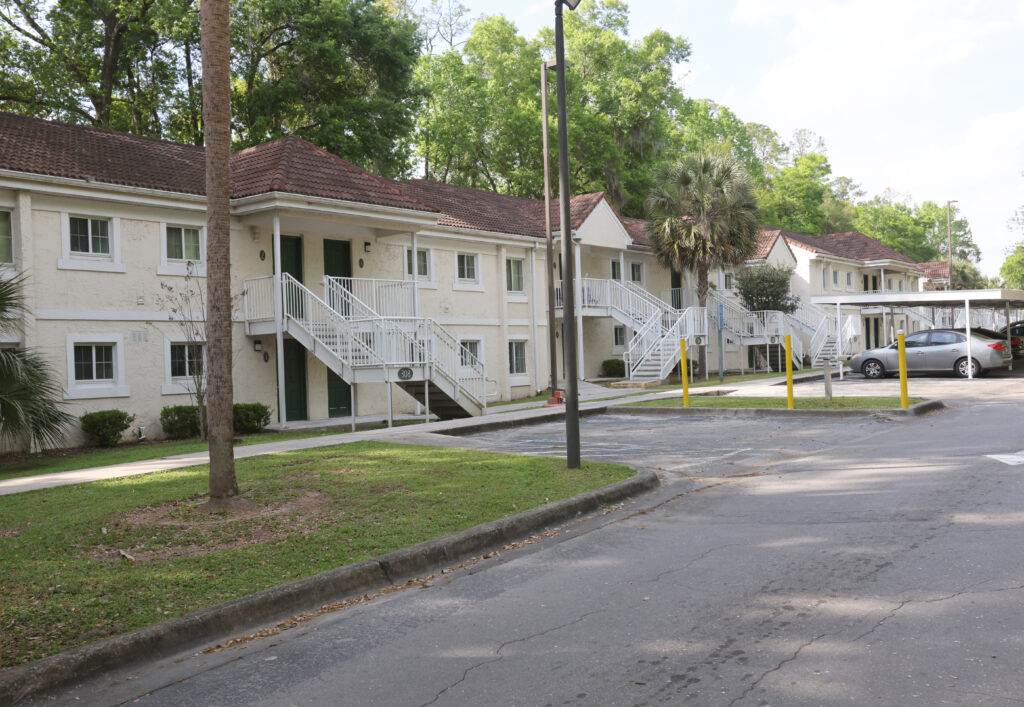Rental assistance program doles out millions

Sutton Place Apartments are shown on Northeast 2nd Street in Ocala, Fla. on Monday, March 15, 2021. [Bruce Ackerman/Ocala Gazette] 2021.

[Bruce Ackerman/Ocala Gazette]
Four months later, about half of the money from the Emergency Rental Assistance program has helped nearly 900 clients. Scot Quintel, local United Way CEO, said so far, the program appears to be positively affecting those it is aimed at helping.
“At the end of [July], there had been 886 households that had been assisted with funding through the (COVID Assistance Program) CAP program. So, that would be either rental or utility assistance, or both,” Quintel said.
To date, a little more than $4.5 million has been spent as a part of the program, Quintel said. They received more than 2,853 applications for assistance.
“We have additional funding. We’re still processing applications as quickly as possible. And we still have a number of other households that are still going through the application process,” Quintel said.
While the U.S. Treasury guidelines requires the money be spent by September 2022, Quintel expects they will run out of funds by the end of the year.
The county is proposing a second round of Emergency Rental Assistance.
The CAP program is targeted to those who have experienced a reduction in income, incurred significant costs or experienced other financial hardship due to COVID-19.
To qualify for the program, an individual must be a Marion County resident; at or below 80% of the average median income; experienced hardship due to COVID-19; provide a valid form of ID; and apply online at UWMC.org/CAP.
While the assistance program is helping, Karla Grimsley, Interfaith Emergency Services CEO, said there are still people struggling with housing.
“We are seeing more and more people calling [us at Interfaith] not because they lost their jobs or that they don’t necessarily qualify for the CARES funding, but because landlords have taken a risk due to the moratorium on rent and now that their properties are worth more, a lot of landlords have opted to sell,” Grimsley said during an Aug. 17 Marion County Commission meeting.
A significant portion of people rent on a month-to-month basis. Rents are also increasing, and leases are not being renewed.
“And we’re getting calls now from people in tears. People who have been good tenants, that now cannot find a place to move to at the same level that they’ve been paying, and there’s just not enough rental units,” she said.
Grimsley said those affected are part of a wave of the “new homeless.” People who have never been homeless in the past and are used to paying their own bills and keeping a roof over their heads—suddenly find themselves without a home.
“It’s been heartbreaking to hear these stories when people call us,” said Grimsley.
The United States Department of Housing and Urban Development (HUD) does provide funds, said Grimsley, but certain rules are applied to how those funds are spent. Rules that do not necessarily help this new wave.
“We do get money from community services,” said Grimsley. “But in order for us to get them we have to subscribe to a model [called] ‘Housing First’—which means our first goal is to house them. We house them first, and then we give them services. And I’m going to tell you, when we get those dollars, we feel like we’re beating our heads against the wall because there’s just not enough housing.”
The housing that is available is not affordable.
“You have to consider that most of the people we work with are disabled; they’re income total is maybe $700-800 a month. There’s no housing that we can put them in,” she said.





